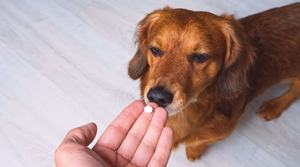
Reviewed & Fact-Checked by
Dr. Chyrle Bonk
Veterinarian (DVM)
Learn more about our Veterinary Review Board »
Making use of flea and tick prevention products for dogs is an excellent idea in many ways and one that vets encourage. It's especially for those pups who live in areas of the country where Lyme Disease and other insect borne illnesses are a problem.
However, recent news stories, and an alert from the FDA about Nexgard allergies in dogs has pet parents worried about using them for their fur kids. But what's the real story behind flea and tick prevention and Nexgard allergies in dogs? That is what we will take a look at here.
What are Nexgard Allergies in Dogs?
Nexgard, and, according to the FDA, other similar products including Bravecto, Credelio and Simparica, are, in their opinion, mostly safe for use by dogs.
The use of flea and tick protection helps prevent flea and tick-borne illnesses. These particular products make doing so easier as they are pills and chewables that are more convenient to administer than many topical medications. They may also be more effective than most types of flea collars.
Nexgard, and the other medications mentioned, make use of an ingredient, afoxolaner, which is a specific type of insecticide that belongs to the isoxazoline chemical compound group. This ingredient, the FDA found, thanks to consumer and vet reports, can cause what has become known as Nexgard allergies in dogs.
What Causes the Allergic Reaction?
At the time of writing, Nexgard and other afoxolaner containing products remain on the market and are still prescribed as effective flea and tick prevention, but now feature the enhanced warnings about allergies that the FDA required be added.
Most dogs tolerate their once monthly dose of Nexgard just fine and their pet parents can feel better about taking them outside during the spring and summer months. A small percentage of dogs however, do have an allergic reaction to the isoxazoline, which is a pesticide, that they contain.
Just why this only occurs in some dogs is not clear. Some may simply have very sensitive skin, some may be prone to certain allergies. Research is ongoing, but no clear 'type' of dog breed is likely to be more prone to a Nexgard allergy.
What Are the Symptoms Associated with Nexgard Allergies in Dogs?
As per the FDA mandate the possible side effects that come along with the taking of Nexgard and other similar products are very clearly printed on the side of the box. Make sure to always read the labels so that you are aware of them.
According to the drug companies and vets who have studied the matter, the most common signs of Nexgard allergies in dogs are as follows:
- Vomiting
- Diarrhea
- Lethargy
- Restlessness, panting
- Skin irritation, itchiness
- Stumbling (in rare cases)
- Seizures (in rare cases)
These things can also be signs of illness not related to flea and tick medications.
Before you stop giving flea and tick preventatives, speak to your veterinarian to rule out potential causes of the signs you're seeing.
How are Nexgard Allergies in Dogs Treated?
When you visit the vet with your pup make sure that you take any unused Nexgard or similar medication, and its box, with you. Be able to provide your dog's vet with information about when it was last given to him.
If an adverse reaction to Nexgard is responsible for your dog's signs, they will likely suggest that you stop using it.
Sometimes allergy testing is used but as this is expensive most vets won't recommend it until the pup has been off the medication for at least 30 days.
During those 30 days you will be advised to take extra precautions to prevent your pup coming into contact with any fleas or ticks.
As Nexgard is a monthly treatment it will take 30 days for it to leave his system completely. There is no way to 'remove' it immediately and so for a few days, the symptoms may remain.
After a month your vet will ask to see your pup again to re-evaluate the signs. If it seems that the medication was indeed the problem, they will discuss alternative flea treatments with you.
Recovery and Prevention
Flea and tick prevention is important for all pups. Dogs can get many diseases from insects like fleas and ticks. This includes Lyme disease, Ehrlichiosis, Rocky Mountain Spotted Fever, Anaplasmosis, Bartonellosis, and Hepatozoonosis. All of these can seriously damage a dog's health and may make other pets and humans ill as well.
Almost all dogs who have an allergic reaction from Nexgard make a full recovery once they no longer take the medication. It's crucial however that another effective method of flea and tick prevention is used.
To discover what this might be for your pup, discuss the issue with your vet. We know that there are a growing number of websites out there that tout 'home remedies' for flea and tick prevention and some pet parents, now wary of medications, are tempted to use them.
Some, like cider vinegar, are harmless, but usually very ineffective. Others, like certain essential oils, can actually be more harmful. As these are applied topically pups tend to lick them off and that can lead to, according to research, vomiting, diarrhea and lethargy - just what you are trying to avoid - and even liver problems, an additional unwelcome complication.
You should always be wary of over-the-counter flea and tick medications. While these are often less expensive, they also don't tend to be as effective and can even be unsafe.
Final Word
Nexgard is a very effective form of flea and tick medication for most dogs. It is also typically a very safe medication, especially when used correctly. However, adverse reactions, though rare, do happen. So, if your vet recommends Nexgard, discuss the possible side effects with him, follow the directions, and keep the box on hand.
The one thing you should not do is decide to ignore effective flea and tick prevention altogether, as the effects of the illnesses they can cause are usually far worse and harder to treat.




